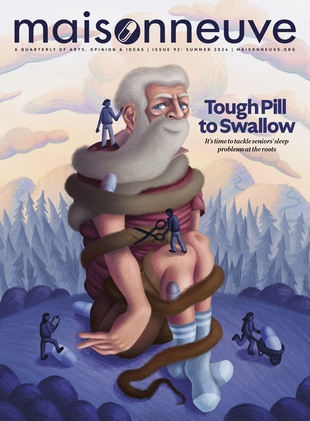Race, The Mindy Project and Why We Need More South Asian TV Characters

When I was growing up in the nineties, no one on my favourite shows ever looked like me. Clarissa may have explained it all, but she sure didn’t have any Sri Lankan friends, and even Boy Meets World was lily-white until season five. My heart skipped a beat whenever South Asians showed up on ABC’s TGIF, but, instead of regular kids who liked cartoons and make-believe, they were often stereotyped poindexters hell-bent on academic annihilation.
One day in 2003, my father brought home a copy of Bend It Like Beckham, which he said was a hit overseas. I was rubbish at sports, and only knew David Beckham by way of Posh Spice, but I must have watched Gurinder Chadha’s film about Jess (Parminder Nagra), a young Sikh girl crazy about soccer, at least twenty times. I could relate to her struggle to abide by a tradition-bound culture when she only wanted to be a regular British girl with a cute boyfriend (pre-rehab Jonathan Rhys Meyers) and scrappy BFF (pre-corset Keira Knightley).
Given Bend It Like Beckham’s international success, I thought it would be the catalyst for more South Asians in starring roles. But despite growing visibility in shows such as House, Parks and Recreation and 30 Rock, these actors were still supporting characters—vital but secondary. In 2010, there were high hopes for the NBC sitcom Outsourced, which centred on office employees in India, but the show’s South Asian actors were subject to offensive stereotypes and the comedy was cancelled after one season. Was it totally unreasonable to hope for a South Asian-helmed show without ugly stereotypes? It seemed so.
Until Mindy Kaling. The actress and writer, who is of Indian descent, had been around since 2005, most recognizably starring as the airheaded Kelly Kapoor on NBC’s The Office. But what most people don’t realize is that the thirty-four-year-old was one of the show’s most prolific writers, penning twenty-four episodes, including the Emmy-nominated “Niagara.” Her collection of essays Is Everyone Hanging Out Without Me? was a New York Timesbestseller. And, last spring, she announced her own show.
The Mindy Project, on FOX, follows Mindy Lahiri, a successful doctor who can’t quite get her personal life together. Mindy sits squarely between Lena Dunham’s listless Hannah Horvath and Tina Fey’s semi-adjusted Liz Lemon: she’s on the verge of being a real grown-up but still believes life should play out like a Nora Ephron movie. The Mindy Project premiered last fall to critical acclaim, and, in March, it was renewed for a second season.
For me, the show is a revelation. I make plans around it, I break plans for it and I’m the annoying girl who live-tweets every episode. I sing its praises to anyone who will listen and I secretly judge them if they say they’re not interested. I have no hand in the production of this series outside of “liking” all of Kaling’s Instagram photos, and yet her success almost feels like my own.
In a way, it is.The last woman of colour to create and star in her own comedy series was Wanda Sykes, whose 2003 show Wanda At Large—about a stand-up-comic-turned-political-correspondent—was cancelled after only two seasons. In 1994, Margaret Cho’s short-lived All-American Girl, which centred on an American (Cho) living with her traditional Korean family, was famously replaced by The Drew Carey Show. Alarmingly, Cho said ABC producers insisted she lose weight and act “more Asian” to draw ratings.
Maybe it’s a testament to changing on-screen racial politics that Mindy’s ethnicity is rarely discussed on The Mindy Project. Though she makes the occasional joke—“It’s a scientific fact that black guys love Indian girls,” says Mindy, on her way to a nightclub—these quips are few and far between, and ethnicity is never the focus of an episode. After decades of blatant tokenism, it feels almost unsettling to have such a de-racialized character in primetime comedy—until you realize that this should be the rule, and not the exception.
Mindy is also the antithesis of the South Asian woman we regularly see in film and television; in fact, she’s the kind of kooky but lovable character Caucasian women have been playing for years. So often, a South Asian actress is cast as the docile beauty who blends quietly into the background or the steely-eyed overachiever with the personality of a lampshade. And all without pushing a size two. Sure, Mindy’s an OB/GYN with a successful practice, but she’s also a regular-sized, outspoken thirty-two-year-old obsessed with Meg Ryan and nail polish.
Perhaps the best part about The Mindy Project, though, is that Kaling—as the show’s creator—is calling the shots, much like Dunham and Fey. While these writers’ successes shouldn’t be evaluated based on their gender or ethnicity, Kaling’s achievement does resonate, particularly in the South Asian community. You can’t be what you can’t see. So how can women of South Asian descent aspire to have thriving entertainment careers if these roles are missing from television screens?
All this is not to say Kaling doesn’t have her share of critics. In response to a photo of The Mindy Project’s writers, the New Republic’s Noreen Malone pointed out that, though Kaling has spoken extensively about the challenges of being a female writer on The Office, men dominate her own writing staff. And the comments on blog posts about the show usually include at least one reader wondering why there aren’t more characters of colour.
If the backlash Dunham received following the premiere of Girls last April is any indication, Kaling will only encounter more scrutiny as The Mindy Project enters a new season. But, as she told HitFix.com in September, “I don’t really think of my work in political terms. I don’t have that much time to do that.” Ultimately, it’s us—the viewers—ascribing our own values and expectations on Kaling and her show. Certainly not all women of South Asian descent have to like, or even care about, The Mindy Project. But if you’ve been waiting a lifetime for a television character with whom you identify, then Mindy is kind of a big deal.





